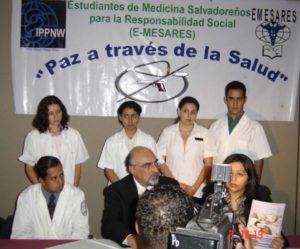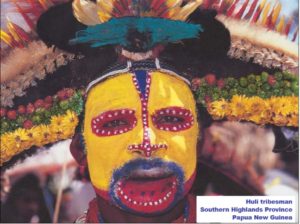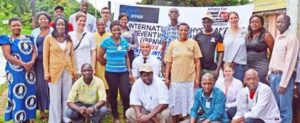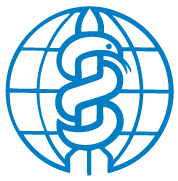Congolese Physicians for Peace
- Epidemiological Study of Injuries Caused by Small Arms/Light Weapons in the Health Facilities of Kisangani, Democratic Republic of Congo. January 1996-December 2002. Research by Simon Bokongo Lofoko Kawaya, MD, translated by Ruku Oyaku Bhileni, MD.
(caution: graphic images)
 El Salvador
El Salvador
- El Salvador The Public Health Dimensions of Small Arms Violence. Presented at UN 2nd Biennial Meeting of States July 2005 by Emperatriz Crespin, MD, MPH, IPPNW-El Salvador
- Epidemiological profile of 100 patients victims of non-lethal wounds by small arms admitted during May 2003 – May 2004 and costs to Rosales Hospital for their medical attention. By Salvadoran Physicians for Social Responsibility, IPPNW – El Salvador and Salvadoran Medical Students for Social Responsibility
- Wounds Caused by Firearms in El Salvador, 2003–2004: Epidemiological Issues. By Ignacio Paniagua, MD, Emperatriz Crespin, MD, MPH, Ademar Guardado, MD, Ana Mauricio, MD
India
- The Continuing Toll of Landmines, presented at the IPPNW 2004 Congress in Beijing. Dr. Balkrishna Kurvey, IIPDEP & IPPNW – Central India
Kenya
- Post electoral violence Kenya. By Racheal Gitau, MD and Walter Odhiambo, MD
- Firearm Injuries in Nairobi, Kenya: Who Pays the Price? Florian Hugenberg, MD, Walter Odhiambo, MD, Angela Mwita, MD, Dedan Opondo, MD
- Multiple Firearm Injury: Report and Review of Literature on the Burden of Firearm Injury in Africa. By Walter Odhiambo, MD, S.W.Gutha, MD and P.W.Thanga, MD
New Zealand and Papua New Guinea 
- The health consequences of tribal gun violence in Papua New Guinea. Dr. Andrew Winnington, IPPNW (New Zealand)
- Medical Student action and the Global Week of Action against Gun Violence. 2009. Letter published in the New Zealand Medical Journal
Nigeria
- Implementing a hospital based injury surveillance system in Nigeria – a preliminary report. Ime John, MD, MPH
- Implementing a hopital based injury surveillance system: a case study in Nigeria. Medicine, Conflict and Survival 2008; 24(4):273-279. Ime John, MD, MPH, Aminun Mohammed, MD, et al
- Gun violence in Nigeria: a focus on ethno-religious conflict in Kano. Ime John, MD, MPH Journal of Public Health Policy.
Uganda
- Health implications of small arms and light weapons in eastern Uganda. Andrew Pinto, Bsc, Peter Olupot-Olupot, MBChB (MUK), Victor R. Neufeld, MD
 Zambia
Zambia
- Implementing a Hospital Based Injury Surveillance System in Zambia – A Preliminary Report. Presented at the 9th World Conference on Injury Prevention and Safety Promotion Merida, Mexico, Robert Mtonga, MD [PPT 3.8MB]
- From Data to Action: The Road Travelled in Implementing the Landmines Ban Treaty in Zambia. To demonstrate how limited data collected by the Zambian Campaign to Ban Landmines helped engender policy changes that led to the implementation of the Ottawa (Mine Ban Treaty) process
- Special Section on the prevention of injuries caused by violence in Vol.24, No. 4 (2008), Medicine, Conflict and Survival. Implementing a hospital based injury surveillance system in Zambia: a preliminary report. Medicine, Conflict and Survival 2008; 24(4):280-284. Robert Mtonga, MD
Zambia /Austria collaborate to help victims of violence
Can a grassroots project with volunteer enthusiasm but a low budget succeed in helping survivors of violence? IPPNW doctors Michael Schober, Austria and Bob Mtonga, Zambia embarked on an ambitious project to see if they could improve care outcomes for survivors in Lusaka, Zambia. Project findings published in the journal Injury Prevention show promise.
“We focused on developing low-cost intervention tools and building on the existing health and social services infrastructures in Lusaka,” said Dr. Schober. The project was designed to raise awareness about social and other services available to survivors. And, to facilitate improved networking among the service organizations caring for victims.
More than 30 medical students from Austria and Zambia participated. Austrian students were trained in project goals and cultural sensitivity. The students collected data over one year at the emergency room of the University Teaching Hospital in Lusaka and at the service agencies. They were overseen by medical supervisors and supported by local medical personnel. Eight local social service agencies partnered on the project.
Surveys were conducted before and after distributing brochures and other materials with service agency contact information at key locations. Analysis revealed that after the intervention survivors had an improved understanding of social services available to them, and how to contact those services and more confidence in articulating health concerns.
All the participants benefited in multiple ways, including cross-cultural awareness.
“We will try to facilitate ongoing partner networking,” said Dr. Mtonga.
- Abstract for the Injury Prevention paper “Improving care for victims of violence in resource-poor settings such as Lusaka, Zambia: results of a low-budget intervention.”
- Overview of Victim Assistance Project Lusaka. 2014. IPPNW Austria and Zambian Healthworkers for Social Responsibility.
Team Zambia/Austria encourages colleagues to adapt or replicate this initiative for the benefit of survivors of interpersonal violence. Please contact mvalenti@ippnw.org for details.


